SMEs have difficulty using e-invoices in transactions
 SMEs are afraid of using e-invoices
SMEs are afraid of using e-invoices
Nacencom, Smartcard Technology Joint Stock Company is one of the few small and medium-sized enterprises (SMEs) to use e-invoices. As the company operates in the field of providing digital signatures, its information technology infrastructure is relatively complete. Therefore, the company finds it easy to apply e-invoices in their business operations.
However, Director of Hien Quan Electronics Company Nguyen Van Tiep was afraid to apply e-invoices in the company’s operations. Tiep said that correcting invoice errors is unavoidable in transactions. Meanwhile, SMEs are still limited in using information technology, so they are not interested in using e-invoices.
According to Circular 32/2011/TT-BTC guiding the creation, issuance and use of e-invoices for goods sale and service provision, e-invoices shall be created, billed and processed in the computer system of an organization having a tax identification number upon sale of goods or provision of services and stored in computers of involved parties under the law on e-transactions.
However, Hoang Quoc Khanh, Director of Nacencom, said that when intermediary e-invoice providers store all data from customer e-invoices, businesses are afraid of losing confidential information. In his opinion, they provide necessary information for relevant agencies to examine the integrity of information contained in the invoices. This is one of the reasons why many businesses do not want to use e-invoices.
Deputy Director General of the General Department of Taxation (GDT), Cao Anh Tuan, said that the country has nearly 500,000 businesses self-printing invoices or having invoices printed on order. The application of e-invoices in transactions is not widely used as it is a new field which requires both customers and businesses to use e-signatures.
Therefore, GDT will create favourable conditions to encourage businesses which are eligible to use e-invoices, while others are encouraged to use software to print invoices. Currently, GDT has asked businesses to provide software for creating and self-printing invoices for six months to one year free of charge. Tuan said it is suitable for SMEs to print their own invoices by computer software.
Are e-invoices only for the rich?
A representative from Vietnam Airlines, Tran Thanh Hien, said that the airline is one of the first enterprises to apply e-documents and e-invoices in their transactions. Hien affirmed that the use of e-invoices has created favourable conditions for clients to store and check information on ticket prices and journeys. For other airlines, the use of e-invoices has helped them share information and implement payments among airline associations.
For example, last year, Vietnam Airlines’ sales turnover through e-invoices reached nearly VND1,500 billion and is expected to reach roughly VND2,000 billion this year, accounting for 4-5 percent of total revenues. Hien said leading airlines in online ticket sales make nearly 20 percent of total turnover in this way, while Vietnam Airline’s online sales account for just 4-5 percent. Therefore, using e-invoices will help the airline speed up the process of selling tickets, improve its competitive edge in the region and the world, and meet customer demand.
Sharing experiences in the issuance and use of e-invoices, some businesses think that management thinking is the key to success. This means that managers should be fully aware that the application of e-invoices is an important solution to improve the quality of services and increase competitiveness. In addition, businesses should be equipped with a complete IT infrastructure and a financial accounting system.
The taxation sector has set up a team to support businesses in some groups and corporations in the field of electricity, post and telecommunications, and aviation to implement the use of e-invoices in their transactions.
What the stars mean:
★ Poor ★ ★ Promising ★★★ Good ★★★★ Very good ★★★★★ Exceptional
Related Contents
Latest News
More News
- Foreign fruits flood Vietnamese market (December 09, 2025 | 13:22)
- Vietnam’s fruit and vegetable exports reach $7.8 billion in first 11 months (December 05, 2025 | 13:50)
- Vietnam shapes next-generation carbon market (November 26, 2025 | 15:33)
- PM urges Ho Chi Minh City to innovate and remain Vietnam’s economic locomotive (November 26, 2025 | 15:29)
- Experts chart Vietnam's digital finance path: high hopes, high stakes (November 14, 2025 | 10:56)
- Vietnam’s seafood imports surge 30 per cent in first 10 months (November 10, 2025 | 19:35)
- Vietnam’s durian exports hit $1 billion milestone (October 30, 2025 | 17:41)
- Beyond borders: Sunhouse and new era of Vietnamese brands on Amazon (October 28, 2025 | 10:46)
- Record-breaking trade fair set to open in Hanoi (October 15, 2025 | 15:59)
- Timber sector seeks solutions to VAT refunds (October 14, 2025 | 18:58)

 Tag:
Tag:




















 Mobile Version
Mobile Version